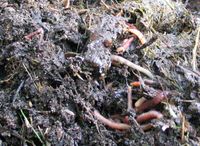Earthworms
| This article is a stub. You can help Marspedia by expanding it. |
Earthworms eat dead organic matter. "Worm farms" (vermiculture) produces highly effective fertilizers and composts called vermicompost (solid) and vermitea (liquid).
Contents
Biology
Earthworms can have a lifespan of up to fifteen years. They are hermaphroditic, and reproduction results in a cocoon producing up to seven young. They will die at temperatures below freezing or above 32 degrees Celsius.
Earthworms regulate their own numbers within the limits of the available food supply.
Varieties
There are about 4700 described species of earthworm, which for agricultural purposes can be divided into three groups:
- Anecic earthworms build permanent burrows fairly deep into the soil and drag food down into their burrows.
- Endogeic earthworms build temporary burrows in shallow soil.
- Epigeic earthworms live in mats of decomposing plant matter on top of the soil. Only epigeic earthworms are suitable for use in vermiculture.
Uses on Mars
- Earthworms might be used in an extensive system of soils for plant production on Mars.
References
M. Murphy - Beginner's guide to earthworm farming: Simple ideas for a sustainable world 2010. ISBN 978-0-143-02676-1







